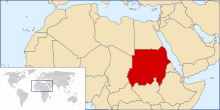Violence increases as Darfur peace talks approach
Friday, October 12, 2007

United Nations Envoy Jan Eliasson said Thursday that negotiating a ceasefire in the conflict occurring in the Darfur region of Sudan will be the main goal of the peace talks scheduled for later this month.
"The first very concrete step ... is that we will go for and hopefully achieve a credible cessation of hostilities," Eliasson said in Khartoum.
"I find the situation on the ground ... deeply alarming. The military escalation is a great source of concern...Haven't we seen enough violence and hopelessness? Don't we see what is happening to the social fabric of Darfur ... torn apart completely -- is this what we want to perpetuate?"
Eliasson also warned that any delay in the negotiations would be detrimental in stopping the violence in the region. Despite protests from rebel leaders, he pleaded for affiliates from all of the numerous rebel groups to attend the peace talks, currently scheduled for October 27th in Libya. Mark Malloch Brown, Britain's Minister for Africa, said Wednesday that rebel groups who do not participate in the peace talks will not benefit from any possible ceasefire deals.
"Anybody who wants to be a legitimate representative of the Darfuri people needs to go," Lord Malloch Brown said.
"If they opt out, they should understand the consequences of doing that - probably their role in the peace negotiations may be finished."
These comments came on the same day that forces believed to be from the Sudanese government and janjaweed militias attacked a fortification in Muhajiriya of the Sudanese Liberation Army (SLA), the only rebel group to co-sign a 2006 peace agreement with the Sudanese government. At least 40 people were killed in the attack.
"Until now the number of dead civilians are at least 40, with 80 missing and a large number of injured," the SLA said in a statement sent to Reuters. They believe that Sudan's army was responsible for the attack, although the government has refuted this accusation.

"There has to be an international investigation immediately," said Minni Arcua Minnawi, an SLA leader who became a presidential advisor in Khartoum. Speculation is rampant about the motivations for the attack, although analysts in Nairobi claim that the rebel movement and the government were barely allies even after the signing of the peace pact.
Another crisis in the peace process occurred Thursday when the main southern political party pulled out of the government due to Khartoum's inability to share power. Former rebels from the Sudan People's Liberation Movement (SPLM) withdrew from the national government after the escalation of violence against rebels.
Adding even more to the uncertainty leading up to the peace talks, UN Secretary General Ban Ki-moon said in a report that Khartoum was delaying the deployment of the African Union-UN hybrid peacekeeping force.
"The implementation timeline for UNAMID is being delayed owing to ... delays in obtaining feedback regarding the list of troop-contributing countries submitted to the government of Sudan," said the Secretary General's report.
"I remain extremely concerned about the continuing violence in Darfur. The ongoing loss of life and displacement of civilians is unacceptable and is not contributing to an atmosphere conducive to peace talks."
Though these events have put the peace talks at risk, all involved know that the success of the talks is critical for the well-being of the region. As Eliasson said, "To miss this opportunity is a tragedy -- this is the moment of truth,".
Sources
- "UN envoy sees more violence in Darfur if peace talks delayed" — Agence France-Presse, October 11, 2007
- "South Sudan crisis adds to Khartoum's Darfur woes" — Agence France-Presse, October 11, 2007
- Opheera McDoom. "Darfur peace talks "moment of truth": U.N. envoy" — Reuters, October 11, 2007
- Mike Pflanz. "Darfur violence grows ahead of peace talks" — The Daily Telegraph, October 10, 2007
| This page has been archived by an administrator, and sighted by a trusted user. It is no longer publicly editable.
Got a correction? Add the template {{editprotected}} to the talk page along with your corrections, and it will be brought to the attention of the administrators. Please note that the listed sources may no longer be available online. The sighting of this article does not guarantee accuracy - it has been sighted for technical reasons. |